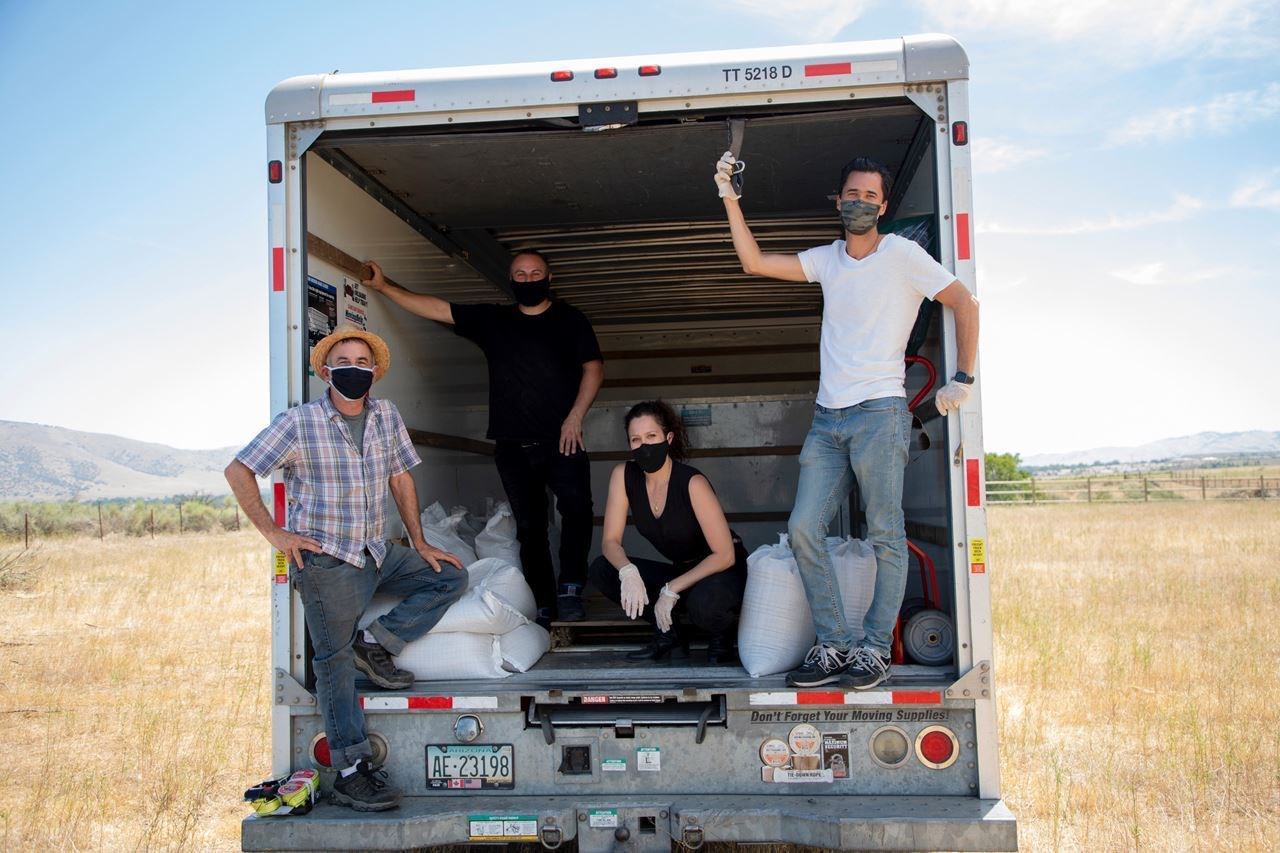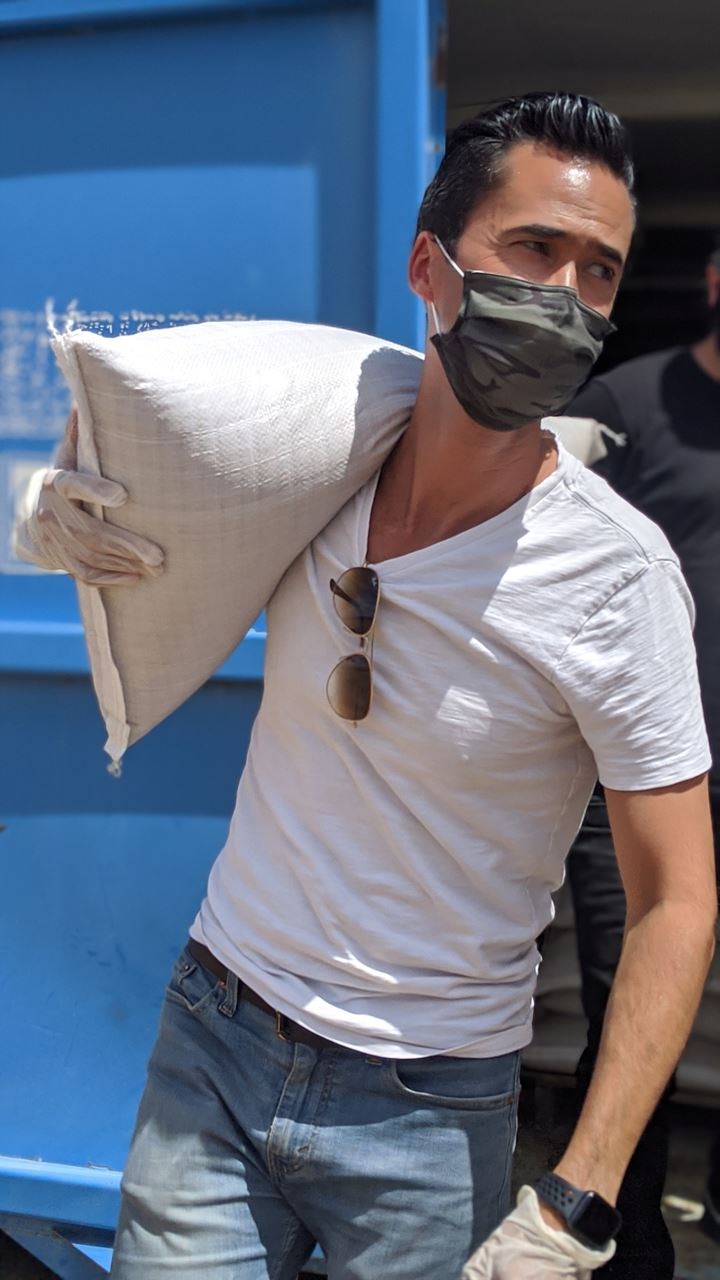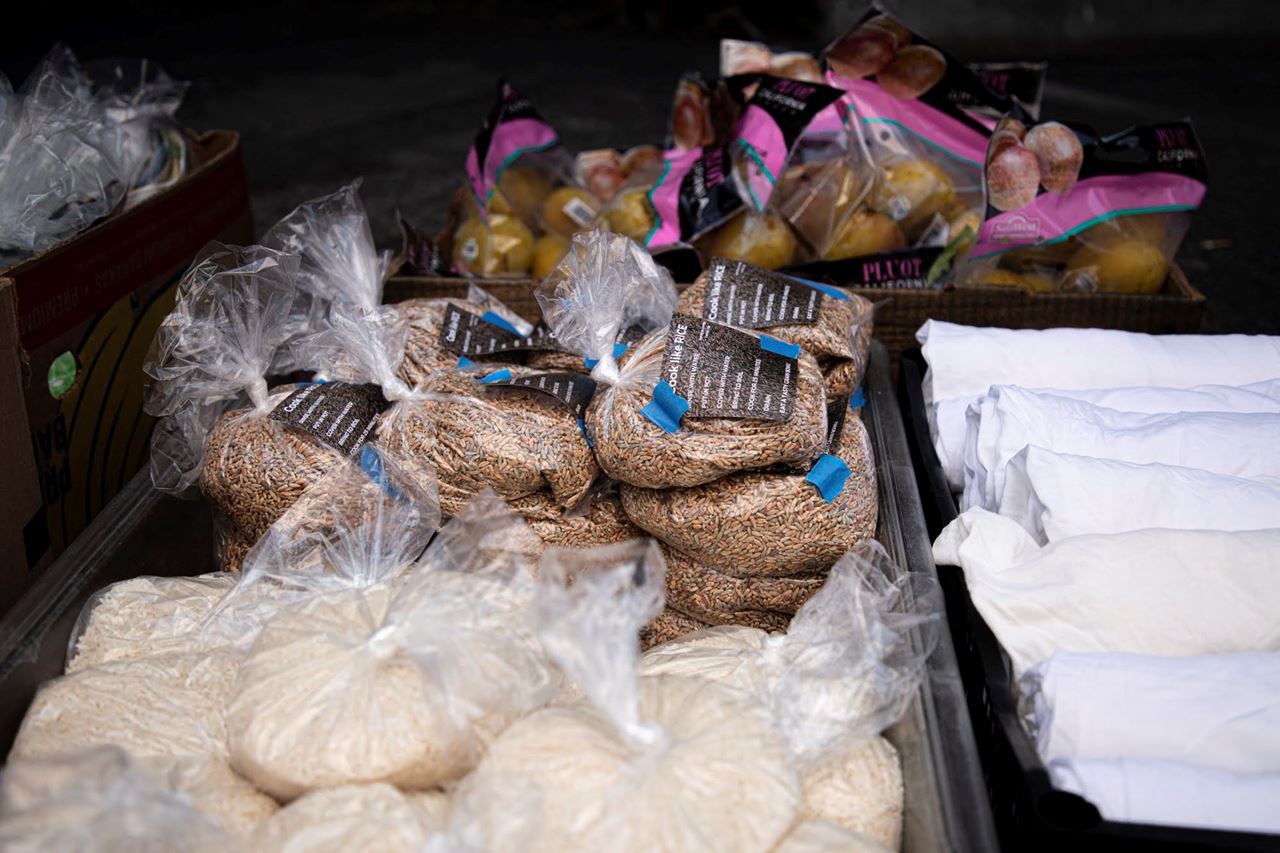The COVID-19 pandemic has shown us that our farm to table food delivery system needs to fundamentally change.
 Alex Weiser of Weiser Family Farms; Henry Fischer, Anna Hopkins, and Eric Holdener of Farm2PeoplePhoto by Catalina Muñoz 2020
Alex Weiser of Weiser Family Farms; Henry Fischer, Anna Hopkins, and Eric Holdener of Farm2PeoplePhoto by Catalina Muñoz 2020
In March of this year, Eric Holdener, Anna Hopkins, Henry Fischer, and Michel Algazi came together to create Farm2People, a nonprofit focused on delivering local, quality produce to food insecure areas of Los Angeles County. The organization came about as a result of the COVID pandemic, as suddenly the day-to-day food supply chain came to a halt. Potatoes were being left to rot, milk was being poured into the fields, and families were left vulnerable. As chefs for Hank and Bean, an event-based cooking business, Anna and Henry wanted to pour their energy into making a difference, as did Eric and Michel, who work as strategists in the food industry. Eric says, “I picked up the phone and called Anna and Henry and said, ‘We need to do something here.’ And so we started the project that way.” They pooled their expertise, did a quick but extensive deep-dive into policy and operations, started the all volunteer-led Farm2People.
Farm2People raises money through crowdsourcing and microdonations to pay local, organic, progressive-style farmers for their excess produce. “If it’s not certified organic, it’s organic in practices,” Anna says, “or they’re doing some form of regenerative non-GMO agriculture. In some way they’re checking that box about being mindful of the soil and soil health, and also the food being produced. And it’s local in the sense that it is from Fresno down to Southern California, in our region in this wonderfully complex agricultural state, coming into the very dense urban area of Los Angeles County.”
 Eric Holdener, Farm2PeoplePhoto by Catalina Muñoz 2020Anna notes that most food relief agencies use what’s called the glean model, where food from a meal pantry or meal program is usually gleaned from leftovers at grocery stores, wholesale markets, the Port of Los Angeles, etc. By contrast, Farm2People works directly with farmers, so they can purchase food that then goes straight to these meal programs. Anna says, “In order to honor the agricultural side of things, we actually have to pay for that produce that’s coming straight from the farm, rather than waiting for it to cycle through all of these other venues and sellers until it is sort of diminished in quality and then going to the agencies. It’s a heavier lift. What we’re able to then do is really offer incredible nutrition and a sense of beauty and a sense of place to people suffering from food insecurity.”
Eric Holdener, Farm2PeoplePhoto by Catalina Muñoz 2020Anna notes that most food relief agencies use what’s called the glean model, where food from a meal pantry or meal program is usually gleaned from leftovers at grocery stores, wholesale markets, the Port of Los Angeles, etc. By contrast, Farm2People works directly with farmers, so they can purchase food that then goes straight to these meal programs. Anna says, “In order to honor the agricultural side of things, we actually have to pay for that produce that’s coming straight from the farm, rather than waiting for it to cycle through all of these other venues and sellers until it is sort of diminished in quality and then going to the agencies. It’s a heavier lift. What we’re able to then do is really offer incredible nutrition and a sense of beauty and a sense of place to people suffering from food insecurity.”
Some food relief organizations use donation-based models. Eric says, “[Food] banks don’t have money to pay for produce. They live on donations, and the donations go in tiny donations, and then they raise money for paying for the infrastructure, for running the operation. No money goes into buying produce. That’s the reality of how things have been designed.” When the pandemic hit, these donation-based and gleaning models proved insufficient to adequately address food insecurity.
While Farm2People values the time and commitment agencies that use the gleaning and donation-based models have put into feeding the hungry, they see the coronavirus as a wakeup call to the immediate need to do things differently. Anna says, "The COVID-19 pandemic has shown us that our farm to table food delivery system needs to fundamentally change. We can't keep relying on a few outsized, highly centralized growers and food producers to provide for the whole nation. Our project is to take a more regional approach.” Eric adds, “All farmers are highly dependent on them and end up at the bottom of the food chain (literally), earning 6 cents on the dollar, while taking all the risks that growing food entails.”
How does Farm2People find these local farmers? They started their search at local farmer’s markets, with varying results. While Los Angeles County has a robust farmer’s market network made up of about 140 different farmer’s markets throughout the county, the pandemic reduced their capacity to 50 percent, and the guidelines, openings and closures were in a constant state of flux. So Henry began calling down lists, utilizing the relationships he had already developed with local farmers for Hank and Bean.
As Farm2People works to change things, they are also incredibly supportive of the agencies that use gleaning and donation-based models, understanding that the most significant change comes from a collaborative effort. “There are tremendous agencies at work here in Los Angeles—like Food Forward, Chefs To End Hunger and Food Cycle—whose shared mission is to glean unsold food for free for distribution to vulnerable communities,” Anna says. “Our approach is additive: We are actually buying fresh food straight from the farm to offer economic support to the farmer before then offering food relief to the community. We are definitely stronger together!”
While Farm2People emerged as a response to the coronavirus pandemic, Eric doesn’t see their organization as transitory. “Dr. Fauci today was talking about the fact that we are ‘entering an era of pandemic,’” he says. “This is not going to go away any time soon. Plus all the potential disasters, in terms of climate change, that has us really asking fundamental questions about how we redesign the food systems. That’s part of what we want to change.” Anna adds, “The farms we seek to support are not only feeding people, but their farming practices are also sequestering carbon, reducing carbon miles in transit from point of origin to the Los Angeles table. They are improving soil health and favoring permaculture practices in place of chemical intervention to create healthier crops! It's a big win all around when we support healthy, regional farming and begin to rely on our region as a source of food for our community."
 Farm2PeoplePhoto by Catalina Muñoz 2020
Farm2PeoplePhoto by Catalina Muñoz 2020
Anna and Eric count two major players in the agricultural sector as their heroes: Fannie Lou Hamer, an American civil rights activist who founded the Freedom Farms Cooperative in the 1960s, and José Andrés, founder of the World Central Kitchen. They say of Andrés, “His Food First Responders program and his Plow to Plate programs in particular provide us with constant motivation and inspiration. WCK works tirelessly to make great impact. We need to multiply WCK's efforts in all our cities and regions, and work to build better infrastructure for food delivery, which means building important cross-sector relationships.” Anna says with a smile, “José can't save the world alone.”
Page created on 9/14/2020 1:32:21 AM
Last edited 4/27/2021 11:22:22 PM

In her capacity as Story Director & General Editor for The MY HERO Project, Shannon Luders-Manuel has interviewed such heroes as author Margot Lee Shetterly, big wave surfer Bianca Valenti, social media influencer Melissa Blake, and social justice videographer Sandi Bachom. She also has essays published in such magazines as The New York Times. http://shannonludersmanuel.com/